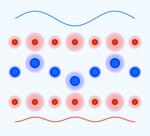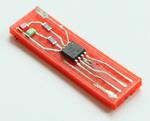Other

“Researchers at the Center for Free-Electron Laser Science (CFEL) have generated a 1.9-femtosecond ultraviolet laser light pulse – setting arecord for ultraviolet (UV) laser pulses with the shortest duration. The experiments, published in the recent issue of the scientific journal …

“Researchers at Universität Hamburg have demonstrated a new scheme for measuring the topological index of a system. The index describes the topological nature of materials and influences certain properties such as the conductivity. The scientists report their findings, which may …

“A study led by scientists of the Max Planck Institute for the Structure and Dynamics of Matter (MPSD) at CFEL presents evidence of the amplification of optical phonons in a solid by intense terahertz laser pulses. These light bursts excite …

“The conductive printing project is an ongoing research topic, aiming at the full integration of complex electronic circuits into 3D-printed objects. 3D-Electronics, an augmented version of the slicing tool Slic3r is under active development. The electronics extension allows to load …

“Transistor are electrical components that are direct electronic signals and enable us to process information. Millions of them are built into every single computer chip, and they are usually made out of the semiconductor material silicon. Dr. Christian Klinke’s …

